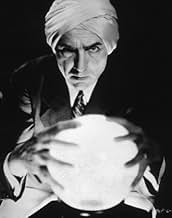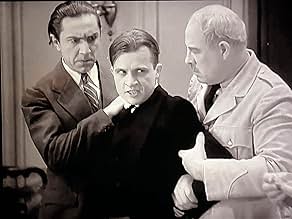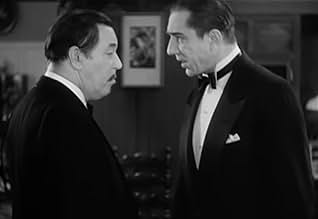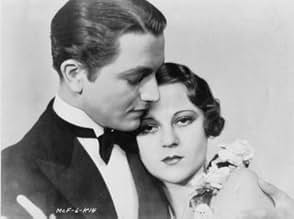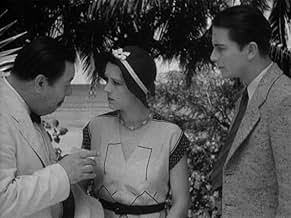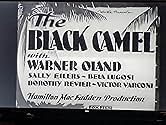NOTE IMDb
6,6/10
1,8 k
MA NOTE
Ajouter une intrigue dans votre langueThe unsolved murder of a Hollywood actor several years earlier and an enigmatic psychic are the keys to help Charlie solve the Honolulu stabbing death of a beautiful actress.The unsolved murder of a Hollywood actor several years earlier and an enigmatic psychic are the keys to help Charlie solve the Honolulu stabbing death of a beautiful actress.The unsolved murder of a Hollywood actor several years earlier and an enigmatic psychic are the keys to help Charlie solve the Honolulu stabbing death of a beautiful actress.
- Réalisation
- Scénario
- Casting principal
Dwight Frye
- Jessop
- (non crédité)
C. Henry Gordon
- Huntley Van Horn
- (non crédité)
Robert Homans
- Chief of Police
- (non crédité)
Hamilton MacFadden
- Val Martino
- (non crédité)
Louise Mackintosh
- Housekeeper
- (non crédité)
Avis à la une
Hollywood star Shelah Fane is filming her latest movie in Honolulu, while keeping her name in the papers with her whirlwind romance to Alan Jaynes, traveling playboy. Shelah decides to send for her psychic consultant, Tarneverro, to advise her if marrying Jaynes is the right thing for her to do, but while consulting with him, Shelah hints of a murder she committed a few years earlier, one Denny Mayo. Later she is found dead by her friend Julie, and the case is turned over to Inspector Charlie Chan, who has to figure out the Denny Mayo connection to both Shelah and the murder suspect. Nice entry in the Chan series, helped immensely by the on location shooting in Hawaii. Even with Lugosi as Tarneverro (a suspect no doubt) the suspects do not really give any sinister or worth-a-closer-look performances here. Yamaoka is really annoying as Chan's bumbling assistant (the latter word used loosely) Kashimo. The main problem with the film is too many characters with their own story in a movie that can't quite crack the B movie mold. Later remade as Charlie Chan in Rio. Rating, based on B mysteries, 4.
I'd seen this film before on a private-edition videotape and have now watched it again on the version in the Fox Charlie Chan, vol. 3 DVD boxed set. This is one of the greatest films in the Charlie Chan series with Warner Oland of the later films that exist only "Charlie Chan at the Opera" (ironically with another horror icon, Boris Karloff, in its cast) matches it thanks to Hamilton MacFadden's dark, atmospheric direction; a script that sticks closely to Earl Derr Biggers' source novel (except for omitting the long prologue on the ship that takes the principal characters to Hawai'i); superb art direction by Ben Carré and a marvelous cast, including Bela Lugosi playing an unusual range of emotions for him (the scene in which he confronts Dorothy Revier early on is especially impressive and not at all what we think of as Lugosi's usual acting style); a welcome reunion between him and his "Dracula" cast-mate Dwight Frye; Robert Young looking like he just graduated from high school as the suitor of Shelah Fane's personal assistant (Sally Eilers); and excellent cinematography by Joseph August and Daniel Clark, more prestigious cameramen than usually worked on the Chan films. It's nice to see Chan's family used the way they were in the Biggers novels (Biggers frequently wrote scenes in which the Chans sit down to dinner and Charlie brings them and us up to speed on the latest developments in his case), and another welcome touch in this film is the artful use of "source" Hawai'ian music in lieu of orchestral underscoring. While it's likely the Hawai'ian location trip only involved a second unit shooting backgrounds (there are some pretty obvious process shots here) and the Hawai'ian music could have just as easily been recorded in L.A. (where there was a large community of Hawai'ian musicians at the time), nonetheless "The Black Camel" is vividly atmospheric. Why Hamilton MacFadden didn't have much of a directorial career after the mid-1930's and none at all after 1945 is a mystery; judging by this film he would have been a "natural" for the noir genre.
With the character loosely based on Chang Apana (1887-1933), a police officer of Chinese heritage, author Earl Derr Biggers wrote six Charlie Chan novels between 1925 and 1932. House Without A Key and The Chinese Parrot were filmed as silents in 1926; Behind That Curtain was filmed, with Chan reduced to a minor character, in 1929. Starring various actors and filmed as individual pieces, none of the films can be described as entries in the series, but in 1931 Fox Studios cast Warner Oland in Charlie Chan Carries On--and with its success Fox Studios discovered a money spinner. Between 1931 and 1942 the studio would create no less than 27 Charlie Chan films, first starring Warner Oland and then starring Sidney Toler.
Charlie Chan Carries On has not survived. The earliest Chan film of the series that still exists is The Black Camel, which is based on the 1929 Diggers novel. The film follows the book quite closely. Shelia Fane (Dorothy Reiver) is an actress who has come to Hawaii to make a motion picture. She has fallen in love with a wealthy man and wants to marry--but she is troubled by something that has occurred in her past. She accordingly sends for psychic Tarneverro (Bela Lugosi), who warns her not to marry--but no sooner does she refuse the marriage than she is found dead, stabbed, in her beachfront home.
Like most of the later Chan films, The Black Camel has a remarkable cast that includes an unexpected number of notables. Bela Lugosi has already been mentioned, and other up-and-comers include Robert Young and character actor Dwight Frye. But this film is very early in the game, and Fox is still tinkering with style and characters; instead of being assisted by a son, Chan is saddled with inept junior officer Kashimo (Otto Yamaoka), a character drawn directly from the Biggers novel. The chemistry is not effective, and although most of the cast offers good performances much the same might be said of the project as a whole.
Part of the problem is the story itself. Apparently suggested by the 1920s murder of Hollywood director William Desmond Taylor, the plot itself is more than adequate, but the "how and why" details of the investigation are awkward. The script itself has an occasional zinger (at one point Chan warns Kashimo that "the wages of stupidity is search for new job!") but by and large it never manages to strike the balance between mystery and comedy for which the series was ultimately famous. It is also a film very much of the early sound era, which is to say visually static, and although it was partly filmed on Hawaiian location one sees little of the islands.
Overall, and while it has its moments, this is really a film best left to Chan fans, who will be interested to see the character at an early stage of development. Unfortunately, however, Chan fans will have a problem latching onto it: it is not presently available on either VHS or DVD and it is seldom broadcast.
Gary F. Taylor, aka GFT, Amazon Reviewer
Charlie Chan Carries On has not survived. The earliest Chan film of the series that still exists is The Black Camel, which is based on the 1929 Diggers novel. The film follows the book quite closely. Shelia Fane (Dorothy Reiver) is an actress who has come to Hawaii to make a motion picture. She has fallen in love with a wealthy man and wants to marry--but she is troubled by something that has occurred in her past. She accordingly sends for psychic Tarneverro (Bela Lugosi), who warns her not to marry--but no sooner does she refuse the marriage than she is found dead, stabbed, in her beachfront home.
Like most of the later Chan films, The Black Camel has a remarkable cast that includes an unexpected number of notables. Bela Lugosi has already been mentioned, and other up-and-comers include Robert Young and character actor Dwight Frye. But this film is very early in the game, and Fox is still tinkering with style and characters; instead of being assisted by a son, Chan is saddled with inept junior officer Kashimo (Otto Yamaoka), a character drawn directly from the Biggers novel. The chemistry is not effective, and although most of the cast offers good performances much the same might be said of the project as a whole.
Part of the problem is the story itself. Apparently suggested by the 1920s murder of Hollywood director William Desmond Taylor, the plot itself is more than adequate, but the "how and why" details of the investigation are awkward. The script itself has an occasional zinger (at one point Chan warns Kashimo that "the wages of stupidity is search for new job!") but by and large it never manages to strike the balance between mystery and comedy for which the series was ultimately famous. It is also a film very much of the early sound era, which is to say visually static, and although it was partly filmed on Hawaiian location one sees little of the islands.
Overall, and while it has its moments, this is really a film best left to Chan fans, who will be interested to see the character at an early stage of development. Unfortunately, however, Chan fans will have a problem latching onto it: it is not presently available on either VHS or DVD and it is seldom broadcast.
Gary F. Taylor, aka GFT, Amazon Reviewer
This is the earliest surviving Charlie Chan film to star Warner Oland as the detective (not counting 1929's BEHIND THAT CURTAIN, which only briefly featured Chan), an entertaining mystery nicely directed with stylish shooting and locations for such an early talkie. Chan is in Honolulu investigating the murder of a young movie actress and tries to untangle the relation between her death and a prior killing of another actor she used to know. Bela Lugosi, fresh after "Dracula" and riding its successes for a brief time in his career, is very good as a mystic involved in the mystery. A real treat of the picture comes whenever watching Lugosi and Oland interacting together. Dwight Frye, Bela's sidekick "Renfield" from "Dracula", also has a part as a butler. A very young Robert Young (of FATHER KNOWS BEST fame) is also on hand albeit in a rather insignificant part. This was the only time Chan was assisted by his bumbling sidekick Kashimo, and it's for the best, as this character is extremely irritating. *** out of ****
The 2nd real Charlie Chan film, the earliest to survive of the 38 that Warner Oland and then Sidney Toler churned out over the next 16 years for Fox and Monogram. Pretty faithful to Earl Derr Bigger's book, this only suffers mildly from the echoey staginess associated with early talkies, with some erratic acting but also some lovely smoky visuals of "Honolulu".
A woman with a dark past is stabbed to death at a hotel - of course all of the guests along with the butler and maid are involved for Charlie to sort through and mull over. Unravelling the threads of the mystery Charlie proved his eyes had microscopic capabilities (wonder how much DNA fingerprinting would've slowed him down?) - and that he was one of those "very clever men able to bite pie without breaking crust". There's a beautiful scene with the entire Chan Clan at the breakfast table that's worth a look on it's own. It all runs delightfully true to form, the excellent polished cast playing up well, especially young Robert Young and Bela Lugosi.
I can't speak for everyone else of course but I still cherish the hope films 1/3/4/5 will one day be found for the additional 5 hours pleasure.
A woman with a dark past is stabbed to death at a hotel - of course all of the guests along with the butler and maid are involved for Charlie to sort through and mull over. Unravelling the threads of the mystery Charlie proved his eyes had microscopic capabilities (wonder how much DNA fingerprinting would've slowed him down?) - and that he was one of those "very clever men able to bite pie without breaking crust". There's a beautiful scene with the entire Chan Clan at the breakfast table that's worth a look on it's own. It all runs delightfully true to form, the excellent polished cast playing up well, especially young Robert Young and Bela Lugosi.
I can't speak for everyone else of course but I still cherish the hope films 1/3/4/5 will one day be found for the additional 5 hours pleasure.
Le saviez-vous
- AnecdotesOf the five Warner Oland Charlie Chan films based on the original Earl Derr Biggers novels, only this one still survives. The other four are believed to have been lost in one of two fires, one in the 1930s and the other in the 1960s.
- GaffesThe knife thrown at Chan when he discovers the scratches under the table couldn't possibly have come from the direction it is thrown from.
- Citations
Wilkie Ballou: Your theory's full of holes. It won't hold water!
Charlie Chan: Sponge is full of holes. Sponge holds water.
- ConnexionsEdited into Who Dunit Theater: Charlie Chan Black Camel (2021)
Meilleurs choix
Connectez-vous pour évaluer et suivre la liste de favoris afin de recevoir des recommandations personnalisées
- How long is The Black Camel?Alimenté par Alexa
Détails
- Durée1 heure 11 minutes
- Couleur
- Rapport de forme
- 1.20 : 1
Contribuer à cette page
Suggérer une modification ou ajouter du contenu manquant

Lacune principale
By what name was The Black Camel (1931) officially released in India in English?
Répondre
